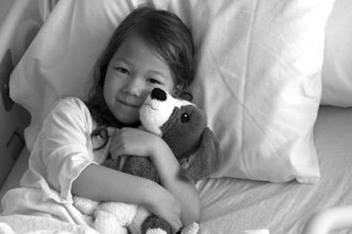Frequently Asked Questions
Please find below some frequently asked questions about 22q11.2 Deletion Syndrome.
If you do not find the question and answer you are looking for, please contact us.
The 22q deletion is thought to affect 1 in every 4,000 people. This number, however, will likely rise as awareness of the condition and its many presentations come to light.
The 22q deletion is caused by a missing piece of chromosome 22. A parent with 22q has a 50% chance of passing it on to his or her offspring. However, only 10% of people “inherit” 22q from a parent. The remaining 90% develop 22q as a new mutation, meaning the missing piece of chromosome 22 happens spontaneously. Parents who have a child with this “de novo” form of 22q do not have a higher risk of subsequent children being affected.
A genetic disorder is a disease whose signs and symptoms are the result of an abnormality in the body’s genetic material. This material is found inside cells and is made up of genes, which reside on chromosomes. The abnormality may be due to missing genetic material (as in 22q), additional genetic material (as in Down Syndrome), or the result of specific inherited or mutated genes.
Genetic material, in the form of genes and chromosomes, is like a blueprint for the development and maintenance of all body systems. When this blueprint is defective, development and maintenance of the affected system becomes disordered and health problems arise. If the brain and central nervous system are affected by the genetic disorder, learning problems and other mental disabilities may occur.
Anyone who is concerned about passing an inherited disease to their offspring should consult a genetic counselor. Since 22q can be passed on in this way, it’s a good idea for those with the 22q deletion to speak with a genetic counselor before having children. Keep in mind, however, that 90% of people with 22q are affected because of a spontaneous and unpredictable genetic mutation.
VCFS stands for the Velo-Cardio-Facial Syndrome. Before the discovery of the q11.2 deletion on chromosome 22, the 22q deletion disorder was known by several names, including DiGeorge syndrome (DGS), velo-cardio-facial syndrome (VCFS), conotruncal anomaly face syndrome (CTAF), Opitz G/BBB syndrome, and Cayler cardiofacial syndrome. Those diagnosed with any of these disorders all have the same underlying condition: the 22q11.2 deletion syndrome.
The expression of 22q varies widely from individual to individual with regard to severity and body systems affected. Your child’s specific medical needs will depend upon these factors. Potential problems include heart defects, learning and language delays, hypernasal speech, cleft palate, feeding difficulties, immune system deficits, kidney problems, growth delay, and behavioral and psychiatric differences. For this reason, it’s a good idea to have a multidisciplinary team on your side—like the 22q Center at Nationwide Children’s Hospital.


